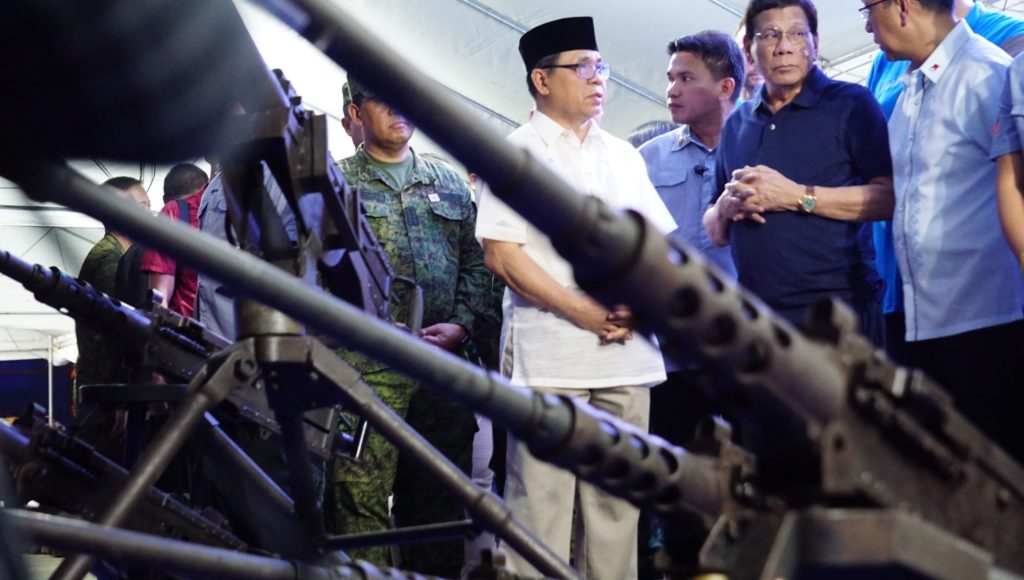Australia/Israel Review
Asia Watch: Trigger Points
Oct 4, 2019 | Michael Shannon

Shortly before sunset on September 8 in the town of Indanan, on the island of Jolo, in the Philippines’ deep south, a “Caucasian-looking” woman in traditional Muslim attire slowly approached a military checkpoint.
“The way she walked, she seemed confused, as though uneasy, and she was alone,” said Lieutenant General Cirilito Sobejana, the Western Mindanao Command chief. “The guard on duty warned the suspect not to cross the checkpoint after noticing unusual behaviour,” he said.
But the woman suddenly blew herself up. No-one else was injured.
“She was holding the trigger mechanism, so we really can say that it was a suicide bombing,” Sobejana added, confirming perhaps the first known female suicide terror attack attempt on Philippine soil. Yet, it was just the latest in a series of suicide attacks perpetrated by Islamic State-aligned terror groups.
The explosion happened just metres from the site where two suicide bombers blew themselves up during an attack that killed six other people in late June. Islamic State leadership in the Philippines claimed responsibility for that attack, as well as a twin suicide bombing that killed 23 people at a church in Jolo in January.
The latest attack was also the second to occur in the volatile region in as many days, after a blast injured eight people at a market in Sultan Kudarat province on Sept. 7. CCTV footage obtained by police showed a man disguised as a woman leaving a bag containing the bomb next to motorbikes parked outside a bakery.
The bomb struck hours before President Rodrigo Duterte and other government officials gathered to witness the “decommissioning” of 1,060 ex-combatants from the Moro Islamic Liberation Front (MILF), who turned over hundreds of firearms. The formalities were part of the peace agreement that MILF and Manila reached five years ago.
Prime suspects are the Bangsamoro Islamic Freedom Fighters, which splintered from MILF over the peace deal and kept fighting for a separate Muslim state in Mindanao. It later pledged allegiance to Islamic State and endorsed the IS-linked siege of the southern Philippine city of Marawi two years ago.
The conclusion of that battle saw the death of IS Philippines head Isnilon Hapilon, who has since been succeeded by local militant Hatib Hajan Sawadjaan. As recently as July, officials reported that little was known about Sawadjaan, except that he was a senior member of the Abu Sayyaf Group, which in the early 2000s was notorious for kidnap-for-ransom raids. He is one of 12 militants recently added by the US State Department as Specially Designated Global Terrorists in its list of international terrorist organisations.
According to the State Department, the designation aims to “deny these terrorists the resources to plan and carry out attacks.”
“All of their property and interests in property subject to US jurisdiction are blocked, and US persons are generally prohibited from engaging in any transactions with them,” the department said on September 10.
The Philippines has recently also received help from a small far-away country – Israel.
For the first time, Israel has provided training to the Armed Forces of the Philippines (AFP) to assist its fight against Islamic State-linked forces – a sign of tightening strategic ties between the two nations. Until now, their military relationship has been confined to weapons sales and the sharing of intelligence about international jihadists.
To dampen any disquiet, particularly among the Muslim population in the south, the ten Israeli Defence Force (IDF) soldiers set foot only in the capital Manila, where they trained 180 Philippine Army troops who will, in turn, pass on those lessons to other soldiers.
The training, which occurred mid-year, focused on how to fight an insurgency in urban and rural areas, including through the use of combat technology such as drones.
The Philippine Air Force plans to procure Israeli-made Rafael Advanced Defence Systems’ medium-range, surface-to-air SPYDER missiles and Hermes medium-altitude, long-endurance drones.
The SPYDER is a low-level, quick-reaction missile system capable of engaging aircraft, helicopters, unmanned air vehicles, drones, and precision-guided munitions, while the Hermes drone, one of the most used worldwide, is designed for tactical missions with payload options that include electronic intelligence gathering and electronic warfare.
Those weapons will bolster Manila’s earlier purchases of Israeli drones, radars and 100 armoured vehicles.
During a four-day visit to Israel in September 2018, Philippines President Duterte thanked Israeli PM Netanyahu for helping to end the Marawi siege which “could have dragged on were it not for the very substantial and crucial equipment” from Israel.
Tags: Israel, Philippines, Terrorism






